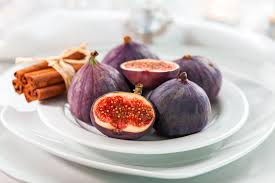Are you a fan of figs? I love September because e fresh figs are in season. Whilst dried figs are available throughout the year, there really is nothing like the unique taste and texture of fresh figs. There sweet intense taste makes them an ideal match for equally sharp ingredients, such as salty prosciutto or my personal favorite crumbled Greek feta!
e fresh figs are in season. Whilst dried figs are available throughout the year, there really is nothing like the unique taste and texture of fresh figs. There sweet intense taste makes them an ideal match for equally sharp ingredients, such as salty prosciutto or my personal favorite crumbled Greek feta!
Figs have many health benefits.
They could help lower cholesterol, as they contain Pectin a soluble fiber. When fiber moves through the digestive system, it helps clear up excess clumps of cholesterol and eliminates them from the body. Soluble fiber may also help you feel fuller for longer because it absorbs water in the digestive tract, which means food moves through the gut slowly.
Figs may help control blood pressure. This is because figs are rich in the nutrients potassium, one of the key mineral accountable for balancing fluids and minerals in our body. Potassium intake helps minimise the effects of sodium on blood pressure.
Figs are also good for your bones as they are rich in calcium, an important mineral that is essential in the development and maintenance of strong bones. They contain 35 mg of calcium per 100g which compare to other fruits is fairly high. They are also rich in phosphorus, which encourages bone formation and spurs regrowth if there is any damage or degradation to bones.
It’s worth noting that figs do not ripen after picking, so choose the ripest fruits you can and eat them within a few days as fresh figs have an extremely short shelf life. They have a thin-skinned that can bruise easily so store carefully. When time permits I try to leave figs in sunlight (usually on my kitchen windowsill) which helps enhances their delicate flavour and gives of a beautiful scent.

